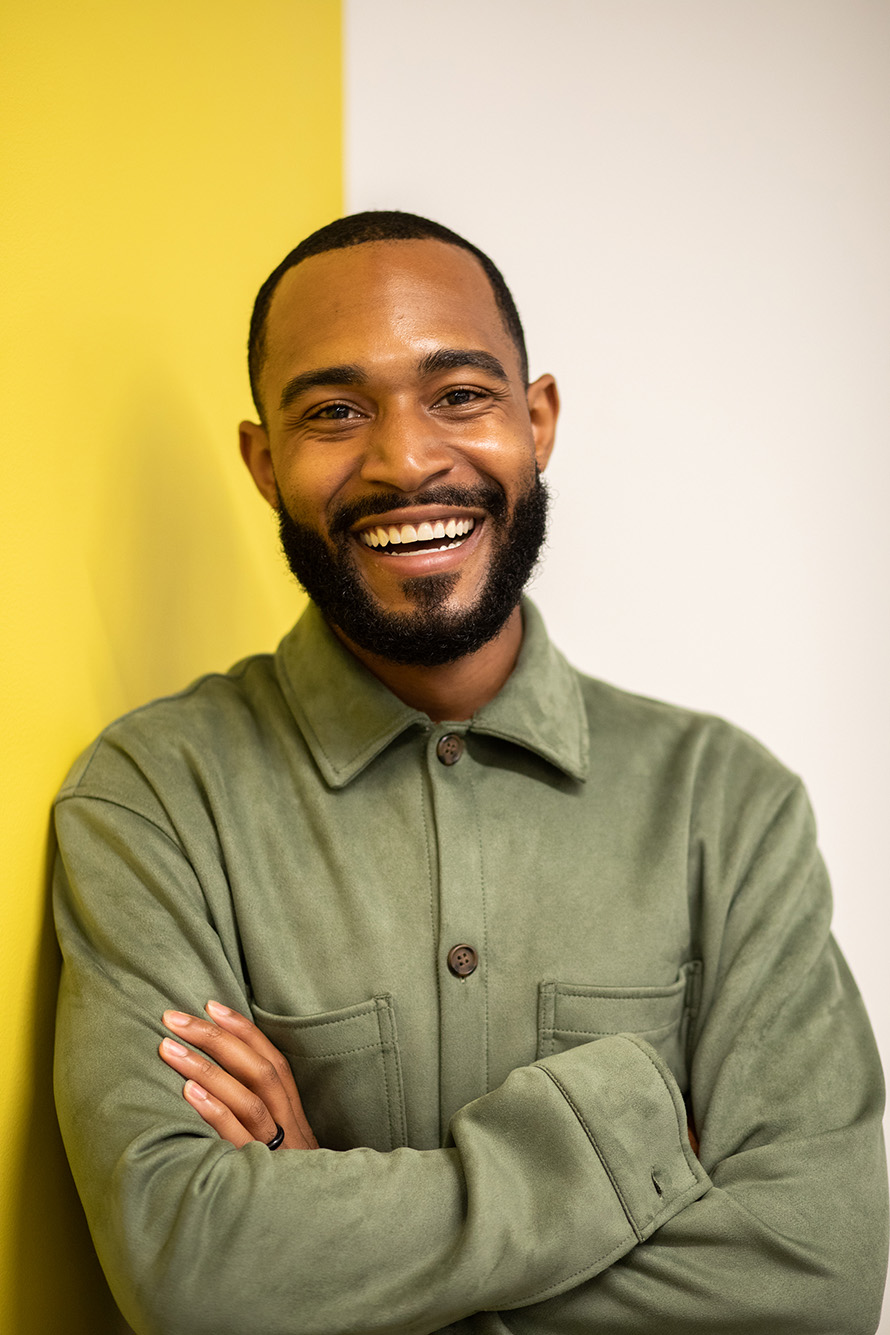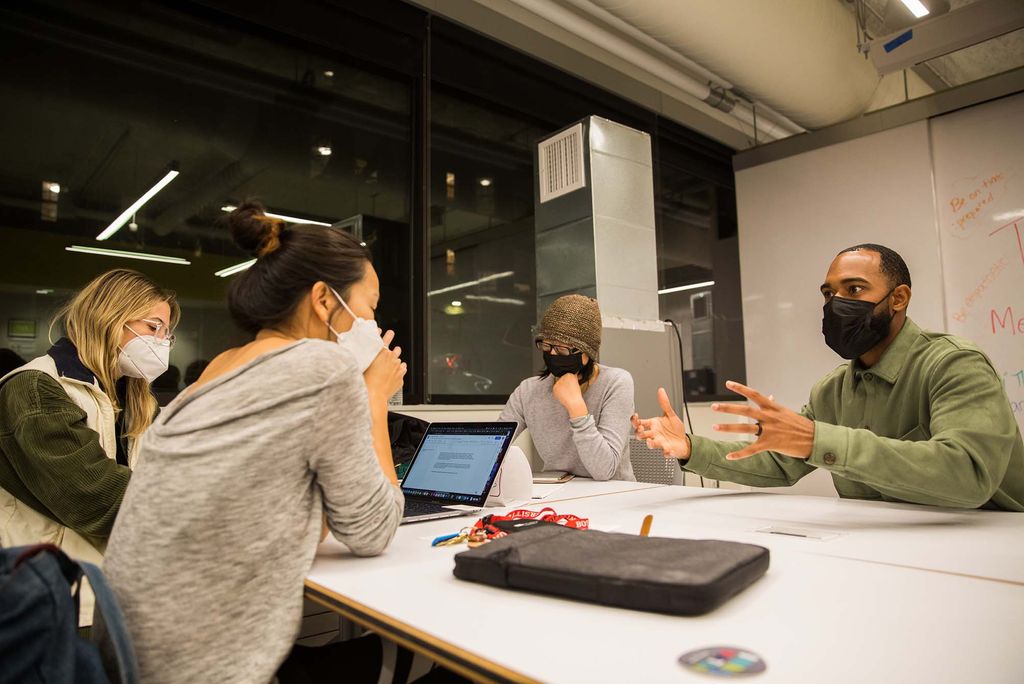Innovate@BU Names Young Alum as Inaugural Innovator in Residence
Jonathan Allen (LAW’19) brings the experience of launching his own nonprofit, Leadership Brainery

Jonathan Allen (LAW’19) is already making his mark as Innovate@BU’s first innovator in residence. “I feel that working in the innovative and entrepreneurial spaces gives me the opportunity to think about how we help people cultivate a sense of consciousness and awareness,” Allen says, “without needing them to be committed to systems of oppression or institutions that don’t value them.” Photos by Jake Belcher
Innovate@BU Names Young Alum as Inaugural Innovator in Residence
Jonathan Allen (LAW’19) brings the experience of launching his own nonprofit, Leadership Brainery
Those who assume that Innovate@BU is designed to help launch only tech start-ups and productivity apps might be surprised to learn that its inaugural innovator in residence, Jonathan Allen, is a preacher-turned-law-school-grad.
In fact, the incubator aims to help all students, regardless of school or major, dream up ideas ranging from a fashion company to antiracism training to an app that helps patients in low-resourced countries find doctors.
That kind of broad mandate excites Allen (LAW’19), himself cofounder of a local nonprofit working with first-generation students—and a 2019 Boston City Council candidate. The innovator in residence program is designed to give BU students access to experienced, influential entrepreneurs they otherwise might never interact with. Students have an opportunity to hear about, and see firsthand, how changemakers operate in their respective fields, and learn about different ways to measure, and strive for, success.
Allen was thrilled to be chosen for the one-year position and looks forward to hearing students’ ideas, challenges, successes “and essentially being a sounding board where we can brainstorm their path forward,” he says. “Because that’s exactly what Innovate@BU is about, and what I want it to embody—a standard of interdisciplinary, cross-sector collaboration. Innovation cuts through every industry and everything that we do.”
Allen first learned about the Innovate@BU team when he visited for some advice for his own start-up, the Leadership Brainery, a national nonprofit he founded in 2013 with his husband, Derek Young, Jr. The organization helps underrepresented students gain access to graduate and doctoral level education and careers. Allen is currently the organization’s director of philanthropy.
“Jonathan really understands what we are trying to do: empower our students to have impact in their careers and communities,” says Gerry Fine, Innovate@BU executive director. “He’s also a social innovator doing good in the community, and we want to make a point that students can be entrepreneurial in many ways. We think he will inspire students.”
As innovator in residence, Allen holds monthly office hours, participates in events such as judging competitions, and hosts a new speaker series, which will feature entrepreneurs from across the country who have built impactful organizations and movements from the ground up. (Our sidebar has more information about the first talk, tonight, Wednesday, November 3.)
Growing up in the Deep South, Allen began preaching at age 11 (his mother swears he was younger than that when he started), and was ordained at age 20. He earned a bachelor’s degree from Grambling State University (a historically Black college) in 2013 and a master’s in political theology from Southern Methodist University in 2016.
He surprised everyone who knew him, he says, when he came out as gay at age 25. And while he used to preach all over the country, the invitations from Black churches soon stopped coming because of his sexual orientation. That experience, coupled with his degree in theology, helped him reexamine his relationship to God, he says, and he has since become less religious and less committed to any one particular religious entity.
Allen began thinking about his next steps, and realized he wanted to “help people cultivate a sense of consciousness and awareness without needing them to be committed to systems of oppression or institutions that don’t value them.”
That led him to launch Leadership Brainery. He recalls that when he and his husband were two of the very few Black men in their respective graduate programs (Young has a master’s degree in public health from Tufts), being told by admissions departments that the reason there weren’t more underrepresented students in their classes was because they couldn’t find enough qualified diverse candidates.
“We didn’t think that was an innovative answer,” Allen says, about the genesis of his nonprofit. “There’s tons of talent out there that deserve to be in these spaces and have access to the opportunity that it yields.” The two believed that if they could provide underrepresented communities with greater access to advanced education, inclusive networks, and resources, those individuals could eventually land higher wage and higher impact jobs. “They are then able to reinvest in their communities, thereby closing wealth and opportunity gaps,” Allen says.
To date, Leadership Brainery has helped over 5,500 students gain access to mentorship, training, conferences, and resources. According to the organization, 72 percent of its applicants are the first in their families to attend college; 22 percent are homeless or living in temporary housing; and 41 percent say they have an immediate need for food. During the pandemic, the nonprofit created a student relief fund that gave more than 100 students access to mini-grants.
In 2019, Allen ran in the primary for Boston City Council District 9 (Allston and Brighton) but lost. He says he hasn’t ruled out running for office in the future and that his first foray into politics taught him how hard it is to break into Boston politics when you’re not from Massachusetts. He credits the campaign with helping him learn much more about Allston, and the history and future of Boston. “I got to really reinforce my own experience here in a way that’s caused me to become even more committed to this community,” he says.

Allen is quickly putting his stamp on his new role as innovator in residence. He’s already been part of a Metropolitan College class panel about creative innovation and entrepreneurship, taken part in a speed mentoring event, and met with students for brainstorming sessions.
PhD student Guillermo Arroyo Ataz (MED’23) is one of the people he helped recently. Ataz is working to develop a medical device for colorectal surgery patients, and he went to a BUild Lab [the physical home of Innovate @ BU] event for information about funding and networking opportunities. There he met Allen, who pointed him in the direction of the BU/MIT Startup Law Clinic and introduced him to a professor in the College of Arts & Sciences economics department. “Jonathan told me of a few potential people he thought I should meet, and then he proceeded to make the introductions,” Ataz says. “I really liked his positive attitude and energy.”
It’s these connections that Allen has worked hard to cultivate, and he now wants to share with others.
“It can be really challenging to build those ventures without all of that privilege,” he says. “So I’m working to inspire innovators to be resilient and network, because it’s those relationships that really help us open up the door to other resources and support systems that can help stabilize and sustain the ventures that we’re creating.”

Comments & Discussion
Boston University moderates comments to facilitate an informed, substantive, civil conversation. Abusive, profane, self-promotional, misleading, incoherent or off-topic comments will be rejected. Moderators are staffed during regular business hours (EST) and can only accept comments written in English. Statistics or facts must include a citation or a link to the citation.